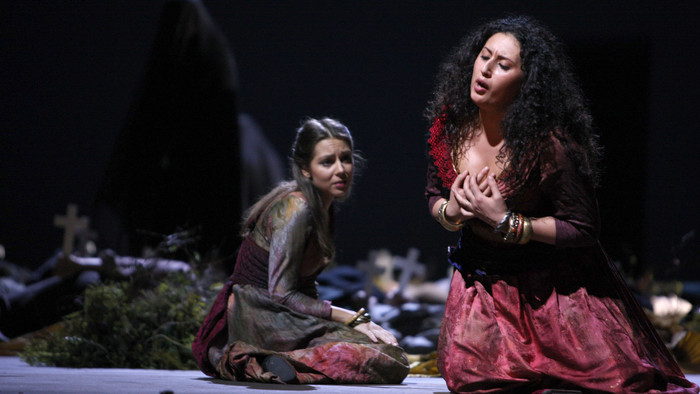Cast & Crew
Carmen – Anita Rachvelishvili
Don Jose – Jonas Kaufmann
Micaela – Adriana Damato
Escamillo – Erwin Schrott
Conductor – Daniel Barenboim
Director – Emma Dante
Set design – Richard Peduzzi
Costume Designer – Emma Dante
Lighting Designer – Dominique Bruguière
Description
Young Georges Bizet died soon after the premiere of Carmen, and thus never enjoyed the success of his creation. Carmen wasn’t initially well received, but became, and still is, one of the most famous and popular works in the opera repertoire. The stark realism (interjected with comedy) was initially considered “too much” for the opera going public; it is now considered a stroke of Bizet’s genius. During an unusually long rehearsal period, the orchestra complained that the music was too difficult, and the chorus complained that it was too challenging to act like a group of individuals, rather than a homogeneous block responding as a unit. Fortunately, Bizet had allies in the production, and his vision for the opera was realized. Composers ranging from Saint-Saëns and Tchaikovsky to Verdi and Wagner all expressed admiration for the work. More so than any “celebrity endorsement,” it is the brilliant music that maintains Carmen’s legacy: even complete opera novices will recognize the famous tunes that make up the bulk of this opera.
Summary
ACT I
Around 1820 the tobacco factory is Seville main attraction. Under military guard, onlookers and visitors – especially men – are busy watching tobacco girls who work for the city’s prosperity. Among them is Carmen, a seductress who chooses her lovers as she pleases. She is less interested in the men who gather around her than in Don José, a taciturn corporal busy straightening his uniform. She throws a flower at him before returning to the factory with her workmates. Impressed by her gesture, José greets a maiden from his native village who brings him a letter and blessing from his mother. Reminiscences of home comfort him and, on his mother’s advice, he contemplates marrying Micaëla. But the tobacco girls coming out interrupt his reading. A fight breaks out between Carmen and another woman. Lieutenant Zuniga orders José to arrest Carmen and take her to jail. After evading his questions, she tries to wheedle José by pretending she is from Navarra like him. He knows she is a Gypsy but cannot resist her powerful charm. She dates him at Lillas Pastia’s inn and, while transferring her to the prison, he lets her slip away.
ACT II
A month later, Carmen and her friends Frasquita and Mercédès are dancing at Lillas Pastia’s, a smugglers’ den outside the city. Zuniga and other officers are ready to prolong their evening but the women dismiss them: what the hell is going on after the inn closes? Yet closing time is delayed as torero Escamillo and his followers appear. The bullring hero is instantly attracted to Carmen who turns down his advances as she did with Zuniga. After they leave, the women welcome smugglers Dancaïre and Remendado, who come for a deal with them. Carmen refuses to follow them: she is waiting for José. After his release from jail, where he spent time for letting Carmen escape, José goes to her. She dances for him when the sound is heard calling the soldiers back to the barracks. Although demoted, José wants to return to quarters. His profession of love fails to relieve resentful Carmen who urges him to desertion. José is determined to carry out his duty when Zuniga bursts in, searching for Carmen. The smugglers stop the altercation between the two men and José is compelled to go along with them.
ACT III
The smugglers are back from Gibraltar and settle down at the gates of Seville. While waiting to smuggle the contraband, the women are reading the cards. Carmen, who is tired of José and has not managed to send him away, reads her tragic death in the cards. She and her friends try to cajole the customs officers while José, consumed with jealousy, guards the camp. Not far from there, Micaëla is looking for José and still hopes to bring him back to an honest life. But José arrests matador Escamillo among the rocks: he is searching for Carmen whom he loves. The two men start a knife fight. Carmen’s arrival interrupts the duel and Escamillo invites the whole gang to a bullfight in Seville. While striking camp, the smugglers find Micaëla hiding. She convinces José to follow her and go back to his dying mother.
ACT IV
The entrance to the bullring of Seville is bustling with life as the cuadrilla procession appears. Escamillo arrives with Carmen on his arm. Both are in peril of death: Escamillo in the arena and Carmen whose life is menaced by José, who is back from his mother’s and lurking among the crowd. Carmen is confronted by José during the bullfight. Rejecting his entreaties, promises, and threats, Carmen throws back to José the ring he gave her. He kills her and gives himself up to the spectators coming out of the bullring
Screenings
- Arkhangelsk
- Astrakhan
- Chelyabinsk
- Chernogolovka
- Chita
- Fryazino
- Irkutsk
- Ivanovo
- Izhevsk
- Kazan
- Khabarovsk
- Kharkiv
- Krasnodar
- Krasnoyarsk
- Kyiv
- Minsk
- Moscow
- Nizhny Novgorod
- Novosibirsk
- Obninsk
- Omsk
- Orenburg
- Penza
- Perm
- Petropavlovsk-Kamchatskiy
- Petrozavodsk
- Pskov
- Rostov-on-Don
- Ryazan
- Saint Petersburg
- Sergiyev Posad
- Severodvinsk
- Surgut
- Tomsk
- Tyumen
- Ufa
- Ukhta
- Ulan-Ude
- Veliky Novgorod
- Yaroslavl
- Yekaterinburg
Runtime
3 h. 12 min.
Language
Recorded screening: French, russian subtitles
16+
